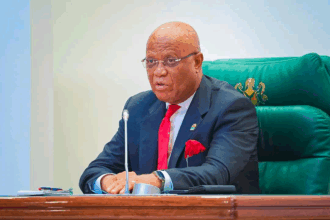The World Poverty Clock has released data indicating that seventy-one million Nigerians are considered extremely poor.
Additionally, the National Bureau of Statistics has classified one hundred and thirty-three million people as multidimensionally poor.
ATTENTION: Click “HERE” to join our WhatsApp group and receive News updates directly on your WhatsApp!
The staggering numbers were quoted by Tonye Cole, the Rivers State’s All Progressives Congress APC governorship candidate, during the recent Nigeria Zero Hunger Symposium in Abuja.
Cole emphasized the importance of developing a practical, sustainable, and easy-to-implement poverty eradication model for Nigeria.
He also explained that over ten thousand children and twenty-five thousand people globally die every day due to hunger, according to the United Nations.
He said:
“Nigeria has the awful distinction of being the world capital of poverty, with 71 million people living in extreme poverty today (World Poverty Clock, 2023) and a total of 133 million people classed as multidimensionally poor according to National Bureau of Statistics data.
“In other words, about 828 million people will wake up every day having no idea when or where their next meal will come from, and many will go to bed that day without eating anything. This is according to a 2021 UN report. The UN further states that of these 828 million people, 25,000 will die today, including more than 10,000 children.
“Nigeria must design a simple, implementable, and sustainable poverty eradication model and stick to it over time.”
According to him, some factors contributed to hunger that need to be addressed.
He said:
“Other factors that contribute to hunger, such as violence, weak government, and health-care systems, must be addressed promptly if zero hunger is to be achieved. These are real difficulties in Nigeria and addressing them is critical not only for hunger eradication but also for the country’s overall progress.
“President Bola Ahmed Tinubu’s (GCFR) government is well positioned to push the goal of strengthening democratic institutions that will yield democratic dividends to the Nigerian people.”
The T200 Foundation’s report revealed that Nigeria was facing a serious hunger problem with a Global Hunger Index score of 27.9. However, the score varies significantly across states.
Yobe State has the highest score of 44.2, followed by Sokoto State with 42.1.
Other states with high scores include Zamfara, Kebbi, and Jigawa. These states were enduring rates of undernourishment and child wasting.
Amb Emmanuel Osadebay, the Executive Director of T200 Foundation, stated the need for collaboration among stakeholders to end hunger in Nigeria by 2030, in line with the Sustainable Development Goals.

